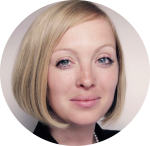WANT TO BE A NEW CHAPTER ALUMNI?
Apply online to share your accomplishments and endeavors.
APPLY TO BE FEATUREDOctober 2017

Freiburg, Germany
Resident, Department of Ophthalmology
Faculty of Medicine, University Medical Center Freiburg
VIEW PROFILELast year Katrin Wacker, M.D. (OPH ’06), completed a two-year postdoctoral clinical research fellowship in the Department of Ophthalmology at Mayo Clinic in Rochester. She fit the fellowship into her residency program in her native Germany. She has returned home to Germany and recently received an award from the Mayo Alumni German Speaking Chapter for her research. Dr. Wacker continues to collaborate with Mayo Clinic and hopes to further an evidence base for more precise treatment of Fuchs’ endothelial corneal dystrophy.
Early on in medical school I was fascinated by research. I did bench work on ocular immunology, which became my medical school thesis. As an ophthalmology resident, I saw many patients in the cornea clinic who had Fuchs’ endothelial corneal dystrophy, the leading indication for corneal transplantation in the western world. My research focuses on clinical studies that investigate the ultrastructure and optics of the anterior surface of the eye — the cornea. My main area of interest is Fuchs’ dystrophy.
In reading about this condition, I inevitably came across many papers from famous ophthalmologists at Mayo Clinic — Sanjay Patel, M.D. (OPH ’99, I-1 ’01, OPH ’04), William Bourne, M.D. (OPH ’75), Jay McLaren, Ph.D. (PHYS ’81), and Keith Baratz, M.D. (OPH ’91). I was interested in focusing more on research and wondered if I should simply keep reading all these papers or try to learn from people at Mayo directly. I emailed Dr. Patel to see whether he might be interested in working with me as a research fellow. Luckily, he was!
I found Rochester to be quite an impressive micropolis, with marble and glass towers in the middle of cornfields. I had never seen such an outstanding yet approachable art collection at a clinic, especially the Chihuly and Mirós.
I’m a research collaborator with Mayo, and we continue with ongoing projects. We have weekly lab meetings by videoconference, and we meet in person at major annual meetings every year. I was recently in Rochester for a weeklong working session.
I plan to subspecialize clinically in cornea and anterior segment disease and further integrate my research and clinical practice. I hope to be able to improve patient care by contributing to evidence-based treatment guidelines for Fuchs’ dystrophy based on our research.
My co-workers and patients in Minnesota often told me about their genealogy research and German ancestry, so it was no surprise to learn there is an active German Speaking Chapter unifying Mayo alumni overseas and German staff at Mayo.
I was excited to meet my fellow German alumni in Göttingen in June for the first time. The topic of this year’s meeting could not fit any better: “Application of Light in Medicine and Research.” My 2017 Rudolf Juchems Award lecture focused on optical properties of the eye and our latest results.
The meeting was a great combination of scientific talks and opportunities to connect with other alumni. We visited the former residence and observatory of mathematics genius Carl Friedrich Gauss and the documenta 14 art exhibition. Scientifically, I was introduced to the latest developments ranging from brain surgery imaging to advances in optical physics that allow high-resolution imaging of synaptic vesicles via stimulated emission depletion (STED).
Eyes are just beautiful and expressive. With the microscope, you can noninvasively observe red blood cells in the conjunctival vessels or single cells at the innermost layer of the cornea, reflecting its health status. I love the challenges of microsurgery that require fine and well-planned approaches.
Vision is such an important part of life for everyone. I find it is very rewarding to help restore patients’ vision.
In my sparse free time, I enjoy the outdoors. Biking, hiking, cross-country skiing and kayaking are my favorites. Rochester was the perfect match with its surrounding state parks but also the Boundary Waters in northern Minnesota.
Other than that, I love cooking and kitchen experiments. I can highly recommend a MOOC (Massive Open Online Course) for scientific cooking on edX. It is a lot of fun to intentionally integrate scientific principles in the kitchen.
See past New Chapter stories here.
Apply online to share your accomplishments and endeavors.
APPLY TO BE FEATURED